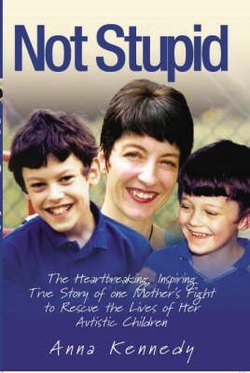Читать книгу Not Stupid - Anna Kennedy - Страница 6
На сайте Литреса книга снята с продажи.
Foreword by Esther Rantzen
ОглавлениеI used to take as my proverb the warning by Edmund Burke, ‘For evil to triumph it is only necessary that good men do nothing’. But that was in my youth, and the young are inclined to be pessimistic.
Now in my maturity – as we old people call our sixth decade – I prefer to turn that saying upside down: ‘For goodness to win through,’ I say, ‘it is only necessary that a good woman does something’ – and you can’t get a bigger, better example of that kind of victory than Anna Kennedy’s story.
What a woman! Sometimes when you watch great athletes leaping over a hurdle you wonder if they really understand how high it is, how many ordinary mortals would give up at the sight of it, or crack their shins painfully at the first attempt, and never try again.
Anna has leapt over hurdles most of us would run from, barriers so high that you wonder how it is that she’s not totally worn out. She is a slender, pretty brunette who doesn’t look like an Olympic athlete, but then among her other huge talents Anna is a dancer, and dancers have a very special energy and grace.
She has needed those skills. To create the school her own sons, Angelo and Patrick, and hundreds of other autistic children in Hillingdon urgently needed, Anna begged, borrowed, persuaded and cajoled individuals, local councillors, companies, charities and the media.
She’s not a rich woman; she’s not a politician – all she originally had on her side were her two sons to inspire her, and her husband Sean to stand alongside her. But she is so eloquent, so committed, and her passion is so infectious that she soon attracted a powerful group of disciples who offered their skills and their money to make her dream a reality, and she attracted a terrific team to provide the skills and expertise she needed.
She didn’t want much. Just an appropriate education for her sons, and for half a million other autistic children in Britain. And yet, given the fashion for inclusive education that all too often is an excuse for stinginess and neglect, and denies disabled children the care and attention they need, appropriate education is heartbreakingly difficult to find.
Special-needs schools have been brutally phased out, instead of being expanded and developed, and, in many places, as the Children’s Commissioner has pointed out, for autistic children such schools simply don’t exist. But now in Hillingdon there is the one that Anna and her team created: Hillingdon Manor, with its glowing Ofsted report, its waiting list, and, alongside it, pioneering provision they have created for older autistic students. Because, as with all parents of disabled children, Anna’s greatest fear is what will happen to them when she is no longer there to fight for them.
Where does Anna get her vision, and the strength to make it a reality? The answers are here in this book. I met Anna only when she was well on the way to creating her school as I was making a television programme about her. Reading about her teenage years, I am eternally grateful to her Italian father, who tried and failed to control her, to stop her going to college, and marrying the man she loved. Winning those early battles and proving she was right must have given Anna the confidence to believe that she could win other, tougher battles.
She and Sean persuaded Hillingdon Council to let her have disused school premises, and Barclays Bank to lend her the money she needed, and an army of volunteers to turn it into an attractive practical school. That was just the beginning, but all the while she was dealing with the dramas and dilemmas in her own family life, for autistic children have a different kind of logic, one that often sets them at odds with the rest of the world.
So there are plenty of moments in this book when you can laugh with Anna, while you are consumed with admiration for her stamina and resourcefulness. How would you like to be stuck on a motorway in the freezing fog in a broken-down car, with a mobile phone that has no signal, and two autistic children? She coped without panicking, just as she coped with all the other ordeals in her life.
This is not a textbook on how to bring up disabled children, nor the best way to teach them, or a toolkit you can use to set up your own school, although I’m sure many parents and communities will use it that way, because there is plenty of useful information for others who want to follow where she has led.
This is not a personal story of victory, either – Anna is far too modest to see it in those terms – but it is a remarkable testament to the fact that one woman can make a difference, if that woman is Anna Kennedy.
So let me rephrase my proverb again: ‘For goodness to triumph, it is only necessary to have Anna Kennedy on your side’.
